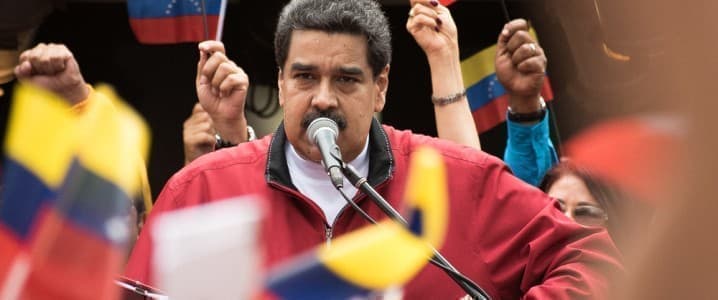Tensions over a long-running border dispute between Venezuela and Guyana are flaring once again. The decades-long squabble originates from Venezuela’s claim over the Essequibo, a sparely populated but resource-rich predominantly jungle region of western Guyana, which comprises nearly two-thirds of the former British colony’s territory. Maduro’s saber-rattling follows on from Exxon, making a swathe of stunning world-class oil discoveries in Guyana’s territorial waters. Venezuela’s territorial claim includes the waters off the coast of the Essequibo, which contains many of those petroleum discoveries. The latest flare-up is an attempt by a desperate Maduro regime to gain access to urgently required resources while distracting the Venezuelan population from the country’s dire economic condition.
The dispute over the Essequibo dates back to 1830, when Venezuela separated from Gran Colombia to become an independent sovereign state. In 1835, the British Empire sent German-born explorer Robert Herman Schomburgk to map Guyana and demark a border with Venezuela. The border drawn by Schomburgk sparked protests from Venezuela, with Caracas claiming Britain was encroaching on the country’s territory. It is this event that ignited the territorial dispute, which has remained unresolved to the satisfaction of both parties to this day. Various attempts at arbitration, including the 1899 Arbitral Award, 1966 Geneva Agreement, 1970 Port of Spain Protocol and 1990 Good Offices agreement, have all failed to resolve the dispute satisfactorily.
Maduro’s latest round of saber-rattling began after Guyana launched its first-ever oil auction with 14 offshore blocks on offer, with eight bids received, including from energy supermajors Exxon and TotalEnergies. Venezuela’s foreign ministry, from Caracas, issued a statement earlier this month (Spanish) saying, “Guyana's arrogant and hostile position, denying dialogue and diplomacy, is the biggest obstacle to reaching a solution,".
The ministry went on to assert, “(Guyana) once again shows itself as a subordinate government, hostage of the transnational ExxonMobil, which prohibits it from resuming sovereign dialogue with Venezuela,".
The statement also said:
““We alert the international community of U.S. intentions to create, in our peace zone of Latin America and the Caribbean, a military base in the Republic of Guyana, to turn that country into the spearhead of an aggression operation against the Bolivarian Republic of Venezuela, which would put the peace and stability of the entire region at risk. The people and the government of Venezuela united in defense of the homeland, will not give in [to] or be intimidated by pressure, blackmail, or threats when it comes to defending the sacred homeland”
Guyana’s government in Georgetown refuses to participate in the meetings proposed by Maduro, and rightfully so, having referred the matter to the International Court of Justice (ICJ) for resolution. The ICJ has been managing the territorial dispute at Guyana’s request since 2018, with the court affirming in a 2020 judgment that it had jurisdiction over the matter. Then, in an April 2023 ruling, the court found the preliminary objections raised by Venezuela in a June 2022 submission, essentially challenging the ICJ’s jurisdiction over the dispute to be admissible. Since then, there have been no further material statements regarding the matter issued by the court.
Guyana has been a recipient of refugees who fleeing Venezuela because of the crisis precipitated by endemic corruption and the autocratic Maduro’s regimes extreme mismanagement of the economy and financially crucial oil industry. It is estimated that of the more than 7 million Venezuelans who have fled their country since 2015, around 100,000 have settled in Guyana, which is around eight of Guyana’s population. This is sparking fears that such a massive influx of Venezuelan refugees into the tiny former British colony of less than 1 million has the potential to trigger civil dissent and other problems, especially if Maduro intensifies his saber rattling.
Guyana is also in the unenviable position of potentially being unable to repulse any invasion of Essequibo by Venezuela militarily. In comparison to Venezuela’s military, which is ranked third in South America behind Colombia and Brazil, Guyana’s defense force is limited in size and equipment. While Venezuela possesses modern tanks, artillery and aircraft as well as a sizable water navy Guyana has very little modern war-fighting equipment and roughly a twentieth of its adversary’s personnel. More concerning is that there are Russian and Iranian military advisers deployed in Venezuela who are embedded within various units.
U.S. designated terror group Hezbollah also has a significant presence in Venezuela, where it is a key backer of the autocratic Maduro regime. Iran has long used Hezbollah as a proxy for its wars in the Middle East, including, most lately, Syria. The support of those powers provides Caracas with access to further modern military equipment and trained manpower, which could be used to overpower Guyana’s defense force. This makes it essential that regional countries such as the U.S. and Brazil act as guarantors of Guyana’s territorial integrity in the face of an increasingly belligerent totalitarian Venezuela.
By Matthew Smith for Oilprice.com
More Top Reads From Oilprice.com:
- Can Oil Prices Remain Below $90?
- Inflation Concerns Grow As U.S. Diesel Market Tightens
- Biden To Slash Offshore Oil And Gas Leasing In New Plan


















